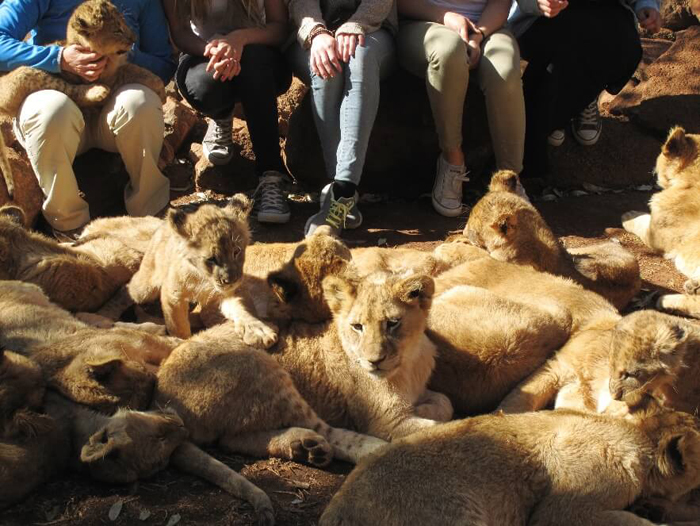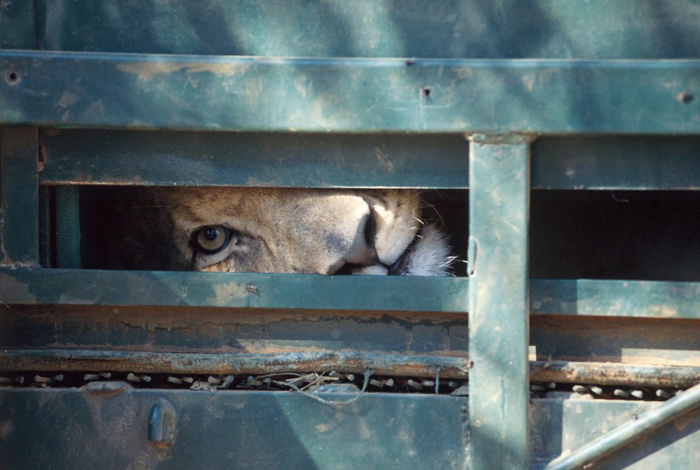Many tourists are lured to South Africa with the prospect of petting a lion cub or walking with young lions. Some come as “volunteers”, paying to stay at lion breeding facilities where they hand-rear cute cubs. All are sold the lie that their money and help go towards increasing lion numbers and conserving the species. These are ‘blood lions’.
The truth is that most of these lions are bred for the bullet, with over 800 captive-bred lions being killed annually by trophy hunters. Due for release at the Durban International Film Festival on 22 July, Blood Lions is set to expose this bloody and brutal industry.
Every single day in South Africa at least two to three captive bred or tame lions are being killed in canned hunts.
There are about 200 farms and breeding facilities holding as many as 7,000 lions in captivity today – about three times the number of wild lions in legitimate conservation areas. Breeding farms supply hunting operators with adult lions to be shot in confined areas. This makes it difficult for the lions to evade hunters, and easier for hunters to locate and kill them. Canned or captive hunting has opened up an entirely new market for people that would otherwise not have been able to afford a wild hunt, and business is booming.
The film follows longtime wildlife campaigner Ian Michler on his quest to uncover the truth behind these breeding facilities and the canned hunting industry. Opponents to predator breeding and canned hunting have been calling for an end to these practices for almost 20 years, but with little lasting success as both practices continue to grow.
“The Blood Lions team believes the film will provide the campaign with a significant boost,” says Michler. “Powerful footage and a compelling narrative from a number of world-renowned conservationists and welfare experts will leave viewers in little doubt as to what is taking place on many private farms across South Africa. Other than greed and ego, there are no reasons to be breeding lions in captivity to be killed in captivity. We believe the film can be a global tool for meaningful change.”
Filming undercover
One of the greatest challenges for Michler and filmmaker Nick Chevallier was gaining access to and filming on breeding and hunting farms that are not open to scrutiny. “Many of the operators, which includes the hunters as well as the cub-petting and other farms, are hostile to any inquisitive questioning because they do not want the fraud exposed,” says Michler.
“Investigative filming techniques became critical to telling this story and to the journalistic process,” explains Chevallier who has been involved with wildlife documentaries for most of his long career. ‘This documentary was different in that the story unravelled over a couple of years. We knew it was going to be a difficult project in view of the secrecy and sensitivity of the topic. Getting access to places was a big challenge, as was trying to film and capture sequences without revealing too much of what we were doing. In the field, it was also emotionally challenging for me, particularly on the breeding farms, and later when viewing footage.”
There is no doubt that the revealing and graphic nature of the film will affect animal lovers and wildlife campaigners alike, potentially motivating them to action. But one of the key questions is if it will motivate trophy hunters and hunting organizations.

Breeding lions have no real conservation or educational purpose
“Given that breeding and canned hunting of lions serves no real conservation or educational purpose, and that the ethics and sportsmanship of the behaviour are seriously questionable, you would have thought that any self-respecting hunter would be completely on-sides in trying to have the practices stopped,” says Michler. “However, the mainstream bodies, PHASA (Professional Hunters Association of South Africa) included, have decided to side with the breeders and canned hunters as these practices provide easy trophies to a far greater market than traditional fair-chase hunting could ever do. Throw in all the other commercial activities such as cub-petting, trading and the volunteer tourist scam, and you have an industry that provides significant profit opportunities to their membership. So the lucrative financial spinoffs have trumped everything else.”
The breeding and hunting industries try to justify their activities on the grounds that they are making significant contributions to conservation, either financially or by protecting the species. But Michler says they can make no such claims and that it is detrimental to conservation. “The breeders and hunters do not work with any recognised conservation agencies or lion ecologists,” says Michler. ‘”y making the claims they do, the true conservation messages and priorities are being confused and vital funding is being directed away from where it is needed most.”
Asked about the ability of such documentaries to generate public awareness, Chevallier said, “Today there are a lot more well researched, investigative type stories out there focusing on cruelty issues and the viewer respects this opportunity of ‘lifting the lid’. As much as viewers worldwide love to watch beautiful natural history documentaries that show animal behaviour in wild settings, the world is changing fast, as are concepts like ‘wilderness’. The global human population explosion is obviously having a major impact on wildlife, as is the commoditisation of nature, and people are catching on to this. There’s more awareness and social media is playing a very big role.”
Hunters standing up against canned hunting
Thanks to this awareness there has been positive progress in the campaign to eradicate the exploitation of wildlife. Recently a number of international airlines banned the transport of animal parts, including hunting trophies, on their flights, and Australia has banned the import of hunting trophies. There is also progress in hunting circles. “There is a growing group of professional hunters here in South Africa that have stood up against the practices. They have taken on PHASA and are prepared to see a split in the body between the ethical and unethical hunters,” says Michler. “I do see opposition to breeding and canned hunting growing significantly across the world and hopefully many more hunting organisations will realise they are damaging their reputation if they continue to support canned hunting.”

A film set to provoke change
Blood Lions has already been accepted in some international film festivals and will be screened in parliaments around the globe, universities and schools, as well as to select audiences of decision-makers.
Chevallier considers himself fortunate to be able to influence some way “I really enjoy tackling nature-based, environmental stories where I can help support the “voiceless”.”
Michler says he sees the film as a significant step up in over 15 years of efforts for him. “The process is unfolding at a quicker rate. Throughout the Blood Lions film and the campaign, I have noticed two things”, he says. ‘One: opposition to hunting, in general, is growing, and, other than for those involved, it is almost universal when it comes to canned hunting. Two: The justifications have run out for the vested interests, especially those that make the killing or make money.”
Visit bloodlions.org to learn more and get involved.
To comment on this story: Login (or sign up) to our app here - it's a troll-free safe place 🙂.![]()






